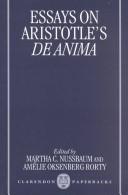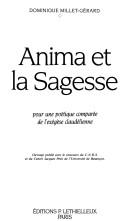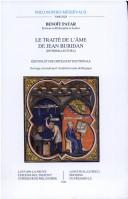| Listing 1 - 10 of 16 | << page >> |
Sort by
|

ISBN: 0198244614 019823600X 9780198236009 0191598100 9786611981006 1281981001 0191519774 0585113076 9780198244615 Year: 2003 Publisher: Oxford Clarendon
Abstract | Keywords | Export | Availability | Bookmark
 Loading...
Loading...Choose an application
- Reference Manager
- EndNote
- RefWorks (Direct export to RefWorks)
Psychology. --- Science [Mental ] --- Psychology --- #GROL:SEMI-1-05'-04' Aris --- Behavioral sciences --- Mental philosophy --- Mind --- Science, Mental --- Human biology --- Philosophy --- Soul --- Mental health --- Aristotle. --- Aristotle --- Psychology and philosophy --- Psychologie et philosophie --- Aristotle. De anima. --- De anima (Aristotle). --- Aristotle. - De anima.
Book
ISSN: 07501978 ISBN: 9782204117593 2204117595 Year: 2017 Volume: 585 Publisher: Paris Éditions du Cerf
Abstract | Keywords | Export | Availability | Bookmark
 Loading...
Loading...Choose an application
- Reference Manager
- EndNote
- RefWorks (Direct export to RefWorks)
"Interrogé par un groupe d'amis sur la nature et les pouvoirs de l'âme, Cassiodore (v. 490 - v. 587), qui fut un temps haut fonctionnaire palatin au service du roi ostrogoth Théodoric le Grand et de ses successeurs, rédigea De l'âme vers 538. Récemment converti, il prend parti sur la question de l'âme, un des lieux de controverse entre philosophie païenne et réflexion chrétienne. En dix-huit chapitres se concluant par une prière, il affirme ainsi sa foi neuve tout en réassumant sa culture classique. Il s'attache à faire apparaître l'âme comme l'instrument et le milieu qui permettent à l'homme d'abord de parvenir à sa propre connaissance et à celle du monde, révélateurs l'un et l'autre de la puissance et de la bonté de Dieu, puis de se préparer à atteindre la condition béatifi que. À partir d'emprunts aussi bien sacrés que profanes, auxquels les citations scripturaires servent de ciment, Cassiodore s'inscrit dans la tradition latine des traités sur l'âme initiée par Tertullien, et compose une oeuvre appelée à connaître une immense postérité."--
Classical Latin literature --- Christian apologetics --- Soul --- Cassiodorus, --- 276 =71 CASSIODORUS --- 276 =71 CASSIODORUS Latijnse patrologie--CASSIODORUS --- 276 =71 CASSIODORUS Patrologie latine--CASSIODORUS --- Latijnse patrologie--CASSIODORUS --- Patrologie latine--CASSIODORUS --- Soul. --- De anima (Cassiodorus, Senator). --- Âme --- Convertis au christianisme. --- Christianisme --- Aspect religieux --- Christianisme. --- Latijnse patrologie --- Soul - Early works to 1800 --- Cassiodorus, - Senator, - approximately 487-approximately 580. - De anima
Book
ISBN: 3402039079 9783402039076 Year: 1974 Volume: 12 Publisher: Münster Aschendorff
Abstract | Keywords | Export | Availability | Bookmark
 Loading...
Loading...Choose an application
- Reference Manager
- EndNote
- RefWorks (Direct export to RefWorks)

ISBN: 2283611628 9782283611623 Year: 1990 Publisher: Paris Lethielleux
Abstract | Keywords | Export | Availability | Bookmark
 Loading...
Loading...Choose an application
- Reference Manager
- EndNote
- RefWorks (Direct export to RefWorks)
Bible --- Claudel, Paul --- Anima (Psychoanalysis) in literature --- Poetry --- Psychological aspects --- Claudel, Paul, --- Criticism and interpretation --- Criticism and interpretation. --- Poetry - Psychological aspects --- Claudel, Paul, - 1868-1955 - Criticism and interpretation --- クローデル, ポール --- Claudel, Paul, - 1868-1955
Book
ISBN: 9060771257 Year: 1981 Publisher: Wassenaar Servire
Abstract | Keywords | Export | Availability | Bookmark
 Loading...
Loading...Choose an application
- Reference Manager
- EndNote
- RefWorks (Direct export to RefWorks)
#GGSB: Dieptepsychologie --- #GGSB: Psychologie --- #KVHB:Psychoanalyse --- #KVHB:Onbewuste --- #GSDBP --- C.G.Jung --- psychologie --- Jung Carl Gustav --- collectief onbewuste --- persona --- anima --- animus --- archetypes --- 159.9 --- 159.964 --- Carl Gustav Jung --- Dieptepsychologie --- Depth psychology --- dieptepsychologie --- Psychologie
Periodical
ISSN: 00048402 14716828 Year: 1947 Publisher: Sydney Australasian Association of Psychology and Philosophy
Abstract | Keywords | Export | Availability | Bookmark
 Loading...
Loading...Choose an application
- Reference Manager
- EndNote
- RefWorks (Direct export to RefWorks)
Philosophy --- Psychology --- Philosophie --- Psychologie --- Periodicals --- Périodiques --- Philosophy. --- Psychology. --- JEX17 --- #FHIW:CAT1 --- #ANTIL0201 --- Périodiques --- EJPHILO EJPSYCH EPUB-ALPHA-A EPUB-PER-FT MDPSYCHO TAYFRA-E --- Behavioral sciences --- Mental philosophy --- Mind --- Science, Mental --- Industries --- Human biology --- Soul --- Mental health --- Humanities --- Arts and Humanities --- General and Others --- Filosofia --- Psicologia --- Ment --- Ànima --- Biologia humana --- Cervell --- Salut mental --- Tests psicològics --- Psychology - Periodicals --- Philosophy - Periodicals

ISBN: 2891331265 906831369X 9789068313697 Year: 1991 Volume: 29 Publisher: Louvain-la-Neuve Éditions de l'Institut supérieur de philosophie
Abstract | Keywords | Export | Availability | Bookmark
 Loading...
Loading...Choose an application
- Reference Manager
- EndNote
- RefWorks (Direct export to RefWorks)
Philosophical anthropology --- Aristotle --- Soul --- Ame --- Early works to 1800 --- Ouvrages avant 1800 --- Buridan, Jean, --- Métaphysique --- --XIVe s., --- Buridan, Jean (1300-1366) --- Traité de l'âme --- --Psychology --- 2343 --- Psychology --- Buridan, Jean --- Filosofie van de Middeleeuwen --- Philosophie du Moyen Age --- Behavioral sciences --- Mental philosophy --- Mind --- Science, Mental --- Human biology --- Philosophy --- Mental health --- Aristotle. --- XIVe s., 1301-1400 --- Psychology - Early works to 1800 --- Aristotle - De anima
Book
ISBN: 9781472558022 9781472558527 9780715628966 9781780932088 0715628968 1472558022 1780932081 1472558529 Year: 2013 Publisher: Bristol Bristol classical press
Abstract | Keywords | Export | Availability | Bookmark
 Loading...
Loading...Choose an application
- Reference Manager
- EndNote
- RefWorks (Direct export to RefWorks)
In On the Soul 3.1-5, Aristotle goes beyond the five sense to the general functions of sense perception, the imagination and the so-called active intellect, the of which was still a matter of controversy in the time of Thomas Aquinas. In his commentary on Aristotle's text, 'Simplicius' insists that the intellect in question is not something transcendental but the human rational soul. He denies both Plotinus' view that a part of the soul has never descended from uninterrupted contemplation of the Platonic Forms, and Proclus' view that the soul cannot be changed in its substance through embodiment. He also denies that imagination sees things as true or false, which requires awareness of one's own cognitions. He thinks that imagination works by projecting imprints. In the case of mathematics, it can make the imprints more like shapes taken on during sense perception or more like concepts, which calls for lines without breadth. He acknowledges that Aristotle would not agree to reify these concepts as substances, but thinks of mathematical entities as mere abstractions. Addressing the vexed question of authorship, H. J. Blumenthal concludes that the commentary was written neither by Simplicius nor Priscian. In a novel interpretation, he suggests that if Priscian had any hand in this commentary, it might have been as editor of notes from Simplicius' lectures. In On the Soul 3.6-13 : this is the fourth and last volume of the translation in this series of the commentary on Aristotle On the Soul, wrongly attributed to Simplicius. Its real author, most probably Priscian of Lydia, proves in this work to be an original philosopher who deserves to be studied, not only because of his detailed explanation of an often difficult Aristotelian text, but also because of his own psychological doctrines. In chapter six the author discusses the objects of the intellect. In chapters seven to eight he sees Aristotle as moving towards practical intellect, thus preparing the way for discussing what initiates movement in chapters nine to 11. His interpretation offers a brilliant investigation of practical reasoning and of the interaction between desire and cognition from the level of perception to the intellect. In the commentator's view, Aristotle in the last chapters (12-13) investigates the different type of organic bodies corresponding to the different forms of life (vegetative and sensory, from the most basic, touch, to the most complex).
Âme --- Philosophie de l'esprit --- Ouvrages avant 1800 --- Aristote, --- Soul --- Philosophy --- Psychology --- Neoplatonism --- Aristotle --- Aristotle. --- De anima (Aristoteles). --- Aristoteles, --- Philosophy of nature --- Intellect --- Ame --- Intelligence --- Early works to 1800. --- Early works to 1800 --- Psychologie --- Early works to 1850 --- Ouvrages avant 1850 --- Philosophie de l'esprit. --- Ouvrages avant 1800. --- Aristote
Book
ISBN: 9782204130004 2204130001 Year: 2019 Volume: 601 Publisher: Paris Les Éditions du Cerf
Abstract | Keywords | Export | Availability | Bookmark
 Loading...
Loading...Choose an application
- Reference Manager
- EndNote
- RefWorks (Direct export to RefWorks)
Composé vers 210-211, le traite De l'âme de Tertullien est l'œuvre fondatrice d'un genre littéraire dans la littérature chrétienne. Se démarquant de Platon et se référant au stoïcisme, le polémiste latin s'y oppose aux tenants (gnostiques) de la préexistence et de la transmigration de l'âme. Parmi bien d'autres traits originaux, il défend notamment sa " corporéité " -- il crée aussi tout un vocabulaire nouveau -- qui font de l'œuvre un écrit sans précèdent. Nourri des traditions médicales de son temps, il s'intéresse également a l'animation et au développement de l'embryon, au sexe de l'âme, au rapport de celle-ci avec le corps, et aux rêves. Théologien, il s'interroge sur la mort et sur le destin de l'âme après la mort. Entre philosophie, médecine, " psychologie ", théologie et littérature, le traite du Carthaginois, ici introduit et traduit d'après un nouveau texte critique, est un ouvrage de référence pour les écrivains chrétiens ultérieurs comme pour la réflexion contemporaine.
Christian religion --- Soul --- Apologetics --- History --- Tertullian, --- Apologetics. --- Soul. --- Early church. --- De anima (Tertullian) --- 30-600 --- 276 =71 TERTULLIANUS, QUINTUS SEPTIMUS FLORENS --- 276 =71 TERTULLIANUS, QUINTUS SEPTIMUS FLORENS Latijnse patrologie--TERTULLIANUS, QUINTUS SEPTIMUS FLORENS --- 276 =71 TERTULLIANUS, QUINTUS SEPTIMUS FLORENS Patrologie latine--TERTULLIANUS, QUINTUS SEPTIMUS FLORENS --- Latijnse patrologie--TERTULLIANUS, QUINTUS SEPTIMUS FLORENS --- Patrologie latine--TERTULLIANUS, QUINTUS SEPTIMUS FLORENS --- Christianity --- Latijnse patrologie
Periodical
ISSN: 02109395 15793699 Year: 1980 Publisher: Madrid Pablo del Rio Editor
Abstract | Keywords | Export | Availability | Bookmark
 Loading...
Loading...Choose an application
- Reference Manager
- EndNote
- RefWorks (Direct export to RefWorks)
Psychology --- Psychology. --- Psychologie --- Periodicals. --- Périodiques --- Health Sciences --- Neurology --- Psychiatry & Psychology --- Factors, Psychological --- Psychological Factors --- Psychological Side Effects --- Psychologists --- Psychosocial Factors --- Side Effects, Psychological --- Factor, Psychological --- Factor, Psychosocial --- Factors, Psychosocial --- Psychological Factor --- Psychological Side Effect --- Psychologist --- Psychosocial Factor --- Side Effect, Psychological --- Behavioral sciences --- Mental philosophy --- Mind --- Science, Mental --- Industries --- Human biology --- Philosophy --- Soul --- Mental health --- Psicologia --- Ment --- Ànima --- Biologia humana --- Cervell --- Filosofia --- Salut mental --- Tests psicològics
| Listing 1 - 10 of 16 | << page >> |
Sort by
|

 Search
Search Feedback
Feedback About UniCat
About UniCat  Help
Help News
News